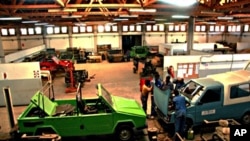Madagascar’s ousted President Marc Ravalomanana is due to return home Saturday from exile in South Africa despite a warrant for his immediate arrest. It has been almost two years since a coup d’etat and ensuing political standoff sparked an economic crisis in Madagascar characterized by the freezing of most foreign aid and investment. The businessmen in the island nation are uncertain about the country’s economy as the crisis prepares to enter its third year.
The President of the American Chamber of Commerce in Madagascar, Robert Strauss, said that although many companies left the country when the crisis erupted, those focused on long-term investment in the country have started to look for new ways to operate in such a difficult environment.
"At the American Chambers of Commerce in Madagascar, we’ve just started a conversation about what the private sector can do in a situation such as this where the political horizon is not clear, so that we can be more responsible for our own future,” Strauss said. “We’re looking to Ivory Coast as an example we want to avoid, where people spend 10 years trying to come up with a solution. That is a decade of opportunity lost."
Investment suspended
Much foreign investment, which once accounted for two thirds of the government’s spending budget, as well as lucrative trade and aid benefits from western governments were suspended after the former mayor of Antananarivo, Andry Rajoelina, seized power with some military backing in March 2009.
The African Union and Southern African Development Community refused to recognize the coup and suspended Madagascar’s membership.
But recently a SADC mediation team changed tack and proposed that Mr. Rajoelina, 36, be recognized to head another interim government until elections can be held later this year.
The proposal bans ousted President Marc Ravalomanana from returning to the country until a governing authority sees fit and he faces arrest and a life prison sentence for murder. But the former president claims the convictions are not recognized internationally and says he will return to participate in talks as Madagascar’s democratically elected President.
Political reforms
The President of Madagascar’s South African Chamber of Commerce, Ray Ferguson, said that the whole political system needed to be reformed to clear out corruption, nepotism and abuse of the legal system before any foreign investor confidence would be restored.
"Blatant corruption, filling their pockets, that is the biggest disaster facing Madagascar,” said Ferguson. “Out of control, no checks and balances, the [justice] Tribunal, the courts don’t work. Without legal law and order the new politicians will come in and fill their pockets just as in the past have done. There is no future without law."
The Vice President of Madagascar’s largest trade group, Noro Andriamamonjiarison, agreed that state intervention was damaging the private sector.
She says she worries about what businesses will do this year, as many have already used cost cutting measures and their own reserves to survive, and there is still no end in sight to the crisis. She says that attracting investors back to Madagascar will be difficult until the government stops changing the rules for doing business.
Exports
Last year, the U.S government suspended Madagascar from the African Growth and Opportunity Act that allowed it to export textiles to the United States duty free. This caused many factories to close and unemployment to rise.
But some businesses have prospered.
The head of Madagascar’s largest textile company, Cotona’s Salim Ismail, said his company, which was 80 per cent reliant on AGOA exports to the U.S, had been able to grow by diversifying to European markets.
He thinks that Madagascar’s reputation for quality garments could help the industry to bounce back.
"Look at Bangladesh; overpopulated, limited resources, meteorological cataclysm,” Ismail said. “These people have, within 20 years, pulled out of poverty about 3 million people. They have raised their export to $10 billion yearly."
Experts said that most large oil and mining companies were used to dealing with instability and would continue to seek out Madagascar’s vast natural wealth, but smaller companies would think twice before dealing with an unrecognized government.
The head of the Madagascar’s Industry Trade Group, Hery Ranaivosoa, thinks Madagascar’s agriculture and manufacturing potential could also make it a major exporter to Europe, China and major regional markets such as South Africa.
He said Madagascar had the same farming capacity as Kenya, and if factories were set up then a ready workforce could make it a major manufacturer too.
However, Ranaivosoa said that before Madagascar can see any development in the private sector at home or abroad, the government had to lay down proper long-term business practices. With elections in limbo until a power-sharing agreement is reached and Mr. Ravalomanana set to return for a possible "democratic revolution”, Madagascar’s private sector may have to brace itself for more uncertainty this coming year.




